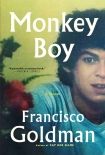Monkey Boy, Francisco Goldman [best story books to read .txt] 📗

- Author: Francisco Goldman
Book online «Monkey Boy, Francisco Goldman [best story books to read .txt] 📗». Author Francisco Goldman
I don’t know, I said.
This is what Padre Rolando told me. It is very confidential, okay. I know you understand, Frankie. They showed Zoila pictures on a phone of her two sisters, her parents, her sister’s children. They said, Now you know we can get you and your family, Zoila, so of course you will not tell any lawyer about the general, the captain, or the warden. When you have your asylum hearing, we will have someone there in the courtroom to listen to what you say.
In a supermarket parking lot here in Boston? Who was it?
Matilda Ercolano Garay. And some men from Guatemala. This is what she told Padre Rolando.
Wow, they really don’t want any of this to get out, do they?
The lawyer took Zoila away; she is hiding. I don’t know when I will see her again. But Frankie, you have to write about this.
María, I would need to speak to Zoila or at least to her lawyer. And verify as much of the story as I could. And I would need Zoila’s permission.
Please, Frankie, I think you can help stop this criminal general from being president. María puts her hands out as if to take hold of mine, but then pulls them back.
I’ll try, María. I promise. Could you tell Padre Rolando I want to speak to him? Maybe he can put me in touch with Zoila’s lawyer. That’s really the only way.
So much for the notion that being up here puts you beyond the reach of General Cara de Culo and Capitán Psycho-Sadist.
Back when she left our house to marry Juan Camacho, María is telling me now, she was already pregnant. But Juan abandoned her, left her alone in their Boston apartment, which she couldn’t afford by herself. She worked as a daytime housecleaner for various families in the suburbs, taking long commutes by train and bus, with an infant, and that was so difficult. When el señor Alberto opened, she says, I was lucky that he hired me. Her son, Harry, graduated from East Boston High too. Then he joined the army and stayed in the service for twenty years. Harry was in a transport battalion in Afghanistan—he did three tours—and now he is out in San Diego and has his own trucking company. He does not like to come to Boston anymore, says María. But someday I will go out there to visit. I have never been to California, she says. Oh, I think you’ll love it out there, I tell her. But the truth is, I’ve never been to San Diego either, though I’ve been to Tijuana. I do like LA.
I’m standing beside María at a folding table as she sorts through heaped laundry. She says, One day el señor Alberto brought me the magazine with your article about our monseñor and the murder, and he said, María, isn’t this the boy you took care of? Could there be more than one Francisco Goldberg from Massachusetts and Guatemala? I was so surprised! Meanwhile María has formed two piles of socks, male and female, it looks like, and with deft snatches she’s bringing matching socks together, smoothing each out with a quick stroke of her hand, her fingers plucking dryer lint like feathers from baby chickens. She lays one sock over its pair to make a cross, folds, tucks, folds, the result is a perfect little sock package. She does this over and over, conversing all the time. There’s something uncanny valley about her hand movements, a true soft machine.
The last time I see Doña Yoli, she says, was I think ten years ago.
You saw her ten years ago?
A little more, I think. María tells me that it was at the Arlington Street Church, when she went to hear Penny Moore give a talk in the basement there. It was full, Frankie. So many people wanted to learn about Guatemala from this woman who is so brave, who knows so much.
Penny sure is exceptional, I say. She’s still a very dear friend of mine. You’re saying my mother was there?
Oh yes, Doña Yoli gave the introduction talk. She did not ever tell you this? She said, I am so proud to introduce my son’s friend Penny Moore.
I never knew about that. If my mother or Penny ever told me, I thought, it must have gone in one ear and out the other; the most likely explanation, I’m ashamed to admit, being that back then all I ever thought about was Gisela Palacios. Those years must all be a blur to Penny now, when that was what she did, traveling the country giving those talks night after night, day after day. But my mother, introducing Penny? Of course, in those years, Mamita was changing, evolving. She heard what people said about the wars in Central America in the college settings she worked in and at the Latin American Society, she read everything I published and she probably read beyond that, too, and she knew about Penny and her work. Mamita, you really did step up, didn’t you. But I didn’t know even the half of it, always nursing my resentment that it was only Lexi who absorbed all your attention. Yet there you were, without me even paying attention, showing your love in this devoted motherly way. Who would have foreseen then that in less than a decade





Comments (0)